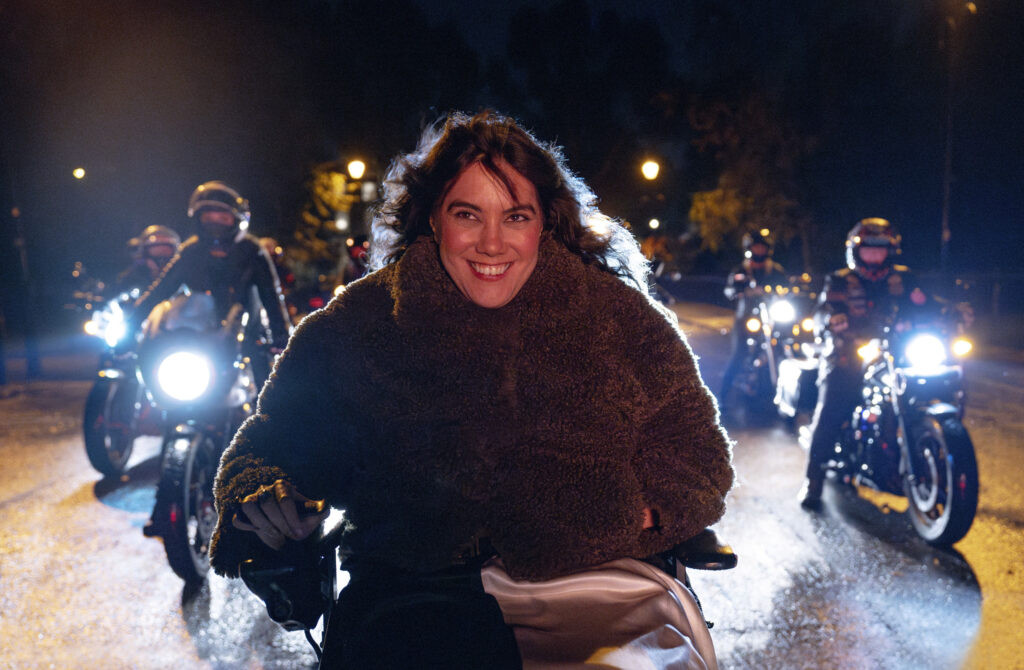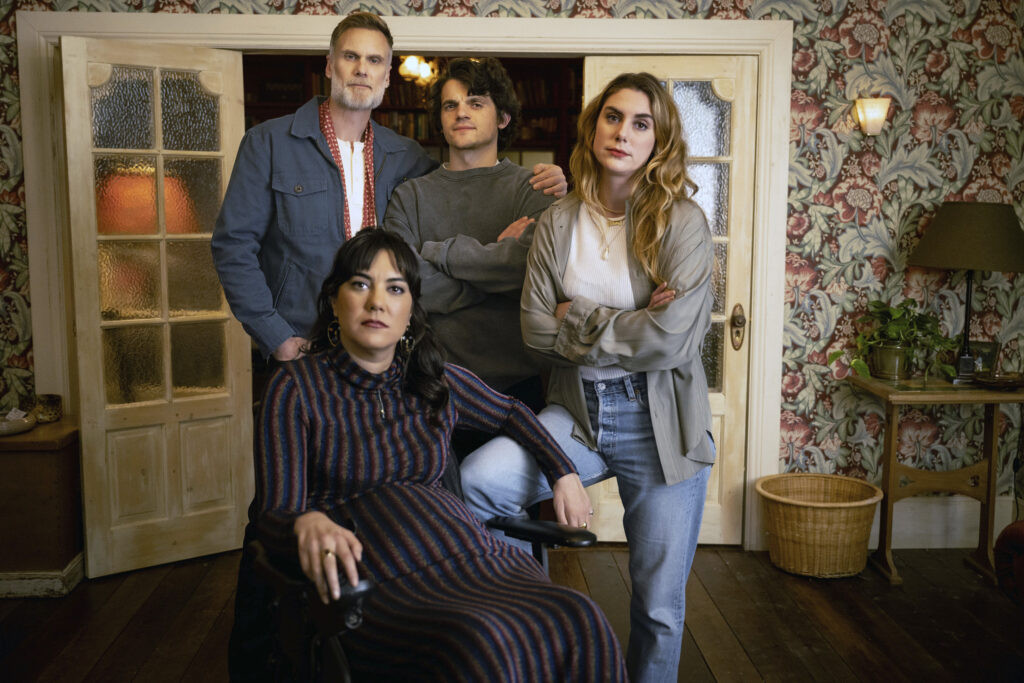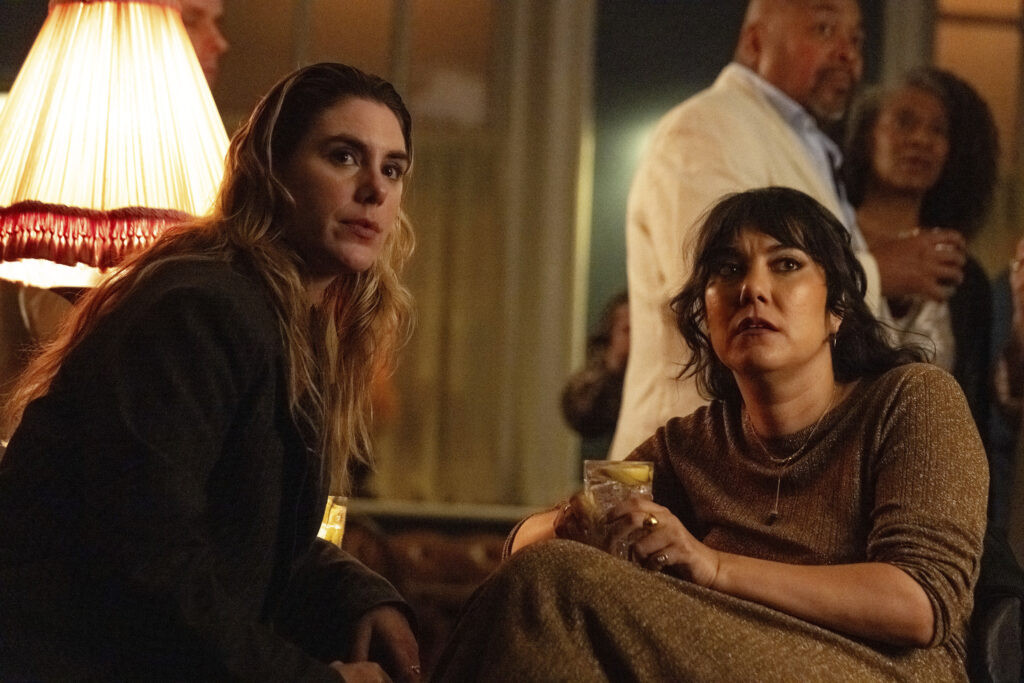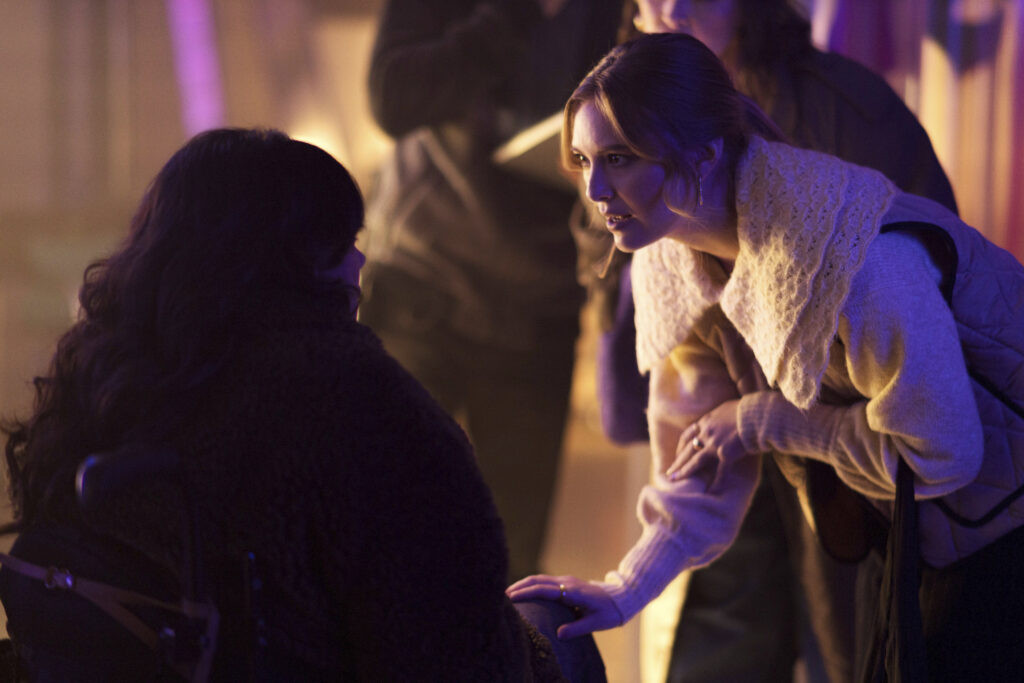Navigating the ever-expanding universe of television, audiences are constantly searching for shows that resonate, challenge, and entertain. In recent times, there’s been a notable call for authentic representation, particularly concerning disability. Enter “We Might Regret This,” a BBC sitcom that’s not just ticking boxes, but smashing them with a sledgehammer of wit and genuine insight. Praised across multiple media outlets as trailblazing, this series, spearheaded by disabled artist and activist Kyla Harris, is prompting viewers and critics alike to reconsider what disability representation on screen truly means. If you’re wondering where to watch We Might Regret This, you’re in the right place to discover why this show is a must-see and where to watch it right now.
 Kyla Harris in a wheelchair leading a motorcycle convoy, representing Freya from We Might Regret This, a BBC show.
Kyla Harris in a wheelchair leading a motorcycle convoy, representing Freya from We Might Regret This, a BBC show.
While some might approach new shows boasting disability representation with a degree of critical weariness – after all, the landscape is littered with productions that pat themselves on the back for surface-level inclusivity – “We Might Regret This” quickly distinguishes itself. Coming on the heels of a welcome surge in progressive disability-focused content, this sitcom deftly sidesteps the pitfalls of becoming an ‘issue-based’ drama. Instead, it immerses viewers in the messy, hilarious, and deeply relatable world of a blended family where disability is simply one facet of a much richer, multi-dimensional narrative. The brilliance lies in its subtlety; the show doesn’t scream “disability awareness,” it breathes it, allowing audiences to connect with the characters and their stories on a human level, often forgetting they’re watching what some might categorize as a ‘disability show’ at all. For many viewers, the most resounding takeaway is simple: pure enjoyment.
One of the refreshing aspects of “We Might Regret This” is its willingness to venture into territories often considered taboo in mainstream television. Forget the sanitized portrayals; this show embraces the realities of living with impairments with a frankness that is both humorous and liberating. From intimate, catheter-related moments to a chandelier crafted from used catheters – yes, you read that right – the series infuses everyday objects and experiences of disability into the fabric of its comedy. It even manages to transform the often-stigmatized topic of incontinence into a poignant expression of love. These moments, while perhaps initially jarring for audiences accustomed to more conventional BBC programming, are not gratuitous. Instead, they are skillfully woven into the broader narrative, highlighting how societal structures, rather than individual impairments, often create disablement.
The innovative genius of creators and writers Kyla Harris and Lee Getty lies in their ability to place questions of personal assistance and the disabled experience squarely in the comedic drama format. This isn’t just about laughs; it’s about inviting audiences to consider complex issues within an engaging and accessible framework. Perhaps the most groundbreaking element of “We Might Regret This” is its seamless integration of these themes into a tapestry of interlocking storylines, making it a show that is both thought-provoking and genuinely funny.
Kyla Harris, who not only co-writes and co-creates but also stars as Freya, is exceptionally positioned to navigate the nuances of disability representation on screen. Her extensive background as an activist and filmmaker, with pivotal roles in organizations like the BFI Disability Screen Advisory Group and Birds Eye View, lends an undeniable authenticity to the show. Her experience is further cemented by her authorship of resources such as ‘A Toolkit for Inclusion & Accessibility’ and ‘The FWD-Doc Engagement Pack,’ underscoring her deep commitment to changing the narrative around disability in film and television.
 Four main characters of We Might Regret This pose together in a home setting, including Kyla Harris in a wheelchair.
Four main characters of We Might Regret This pose together in a home setting, including Kyla Harris in a wheelchair.
While Freya might initially appear to be the central figure, “We Might Regret This” truly operates as an ensemble piece. The title itself hints at the collective experience of regret, suggesting a narrative that revolves around all the characters within this newly formed blended family and their close circle. Freya’s arrival, alongside Jo (played by Elena Saurel), acts as a catalyst, propelling the lives of Abe (Darren Boyd), Freya’s boyfriend; Ty (Aasiya Shah), Freya’s Personal Assistant; Jane (Sally Phillips), Abe’s former wife; and Levi (Edward Bluemel), their son, into a whirlwind of interconnected and often chaotic situations.
This emphasis on shared protagonism is crucial to the show’s success as a polyphonic narrative. The strength of “We Might Regret This” lies in its multiple, interwoven stories, ensuring both entertainment and a progressive perspective. Despite marketing materials and some reviews that might foreground Freya’s role, the series, as the BBC aptly describes it, is deliberately “messy.” Viewers are likely to find their allegiances shifting throughout, mirroring the complexities of real life where no single person is truly at the center, yet every life holds significance.
One of the show’s most significant contributions to intersectional disability representation is its refreshing cynicism towards superficial attempts at inclusivity. This is a perspective that feels authentically ‘insider,’ likely born from Harris’s own experiences. This knowledge permeates both the overarching narratives and the subtle details of the script, such as the cringeworthy, patronizing use of “our” before a disabled person’s name. This grounding in lived experience is palpable from the outset, particularly in the first episode, laying a foundation for a deeper exploration of relationships and interdependencies.
 Jo and Freya, two female characters from We Might Regret This, engaged in a conversation at a party setting.
Jo and Freya, two female characters from We Might Regret This, engaged in a conversation at a party setting.
The series plunges viewers directly into the lives of Freya and Abe as they navigate the chaos of a housewarming party disrupted by the unexpected early arrival of Jo, Freya’s newly homeless and nomadic friend. The deep bond between Freya and Jo is immediately evident, despite Abe’s initial dismay. This friendship becomes a cornerstone of the narrative, with Jo’s understanding of Freya and the intricacies of disablement proving pivotal. It’s not a spoiler to reveal that Jo becomes Freya’s PA, a relationship mirroring the real-life dynamic between Harris and Getty, adding another layer of authenticity to the storytelling.
“We Might Regret This,” much like other recent shows featuring disabled actors, establishes its agenda swiftly. The opening scene throws the audience directly into an intimate moment between Freya and Abe, immediately challenging conventional representations of disabled bodies and sexuality. This is quickly followed by the introduction of Ty, Freya’s PA, whose well-meaning but often tactless remarks serve to further dismantle outdated tropes of disability. Ty’s character, with her “dolphin frequency annoying personality,” effectively satirizes and subverts tired narratives of bravery and pity, while simultaneously reclaiming agency and desire for disabled individuals. By dismantling these outdated portrayals early on, the show sets the stage for a more nuanced and progressive exploration of disability.
Building on this foundation, “We Might Regret This” launches a sharp critique of shallow diversity initiatives, a theme explored through various characters and scenes. In one instance, Freya prepares for a modeling interview, explaining to Jo her pragmatic reasons for seeking out such opportunities – the need for work and independence, coupled with the observation that “disability’s having a moment.” This line encapsulates the satirical tone of the first episode, which cleverly pastiches superficial inclusivity strategies, setting the stage for the show’s deeper engagement with these issues.
 A white woman in a suit leans in condescendingly to speak to Freya, a wheelchair user, during a modeling interview scene from We Might Regret This.
A white woman in a suit leans in condescendingly to speak to Freya, a wheelchair user, during a modeling interview scene from We Might Regret This.
The modeling interview scene itself is a masterclass in comedic satire. Freya encounters two agents, both named Olivia – a witty nod to their interchangeable, almost Tweedledum and Tweedledee personalities – who embody the superficiality of performative diversity. Their dialogue is riddled with microaggressions and blatant prejudices, unintentionally revealing the uncomfortable realities of diversity casting. Disregarding Freya’s professional pitch, Olivia One gushes about Freya’s “raw talent,” while Olivia Two escalates with an over-the-top declaration of Freya being “the most f***ing stunning woman I’ve ever seen in my life.” The scene culminates in Olivia Two’s spectacularly ignorant statement, mistaking Freya’s mixed-race identity and assuming she is a “proud white disabled woman.” Freya’s composed correction, identifying as “part Guyanese, part Chinese,” is met with further cluelessness, highlighting the agents’ obsession with ticking diversity boxes rather than genuine understanding or respect.
In its deft blend of comedy and satire, “We Might Regret This” draws comparisons to other acclaimed BBC dramas like “The Split,” while forging its own unique path. It excels at challenging everyday norms and assumptions, shifting the focus from individual impairments to the societal structures that create disablement. The show wisely centers family and romantic relationships, rather than solely dwelling on the broader systemic barriers faced by disabled people. While the series primarily focuses on interpersonal dynamics, a minor critique might be the occasional individualization of burdens associated with disability. For example, a scene where Freya’s desire to drink is questioned due to her catheter needs subtly touches upon the societal pressures disabled individuals face in conforming to able-bodied norms, sometimes at the expense of their own well-being. However, this is a nuanced observation within a show that largely excels in its portrayal of everyday cultural attitudes towards impairment, disability, and ethnicity.
Ultimately, “We Might Regret This” is a triumph. It’s a single show that manages to do a lot, and do it exceptionally well, with a deceptively light touch. Its elegant portrayal of everyday cultural attitudes towards impairment, disability, and ethnicity is both insightful and entertaining. Thankfully, the series concludes with a cliffhanger, sparking hope for a second season. The question isn’t just what happens next for the characters, but also for Kyla Harris and the continued evolution of disability representation on television.
Where to watch We Might Regret This? You can stream the entire series on BBC iPlayer. Don’t miss this groundbreaking and hilarious sitcom that’s changing the conversation around disability on screen.
